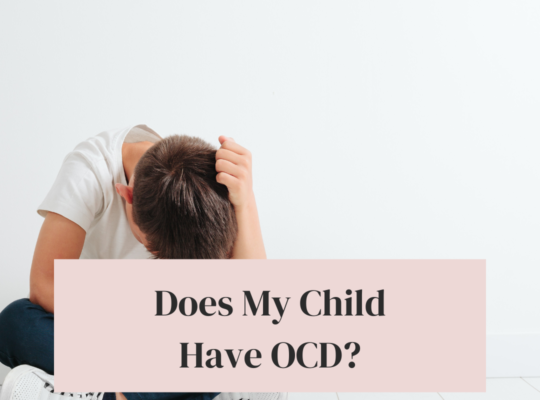Top 10 Tips To Supporting Childhood OCD

When parenting childhood OCD, it can be all too easy to do the wrong things.
This can lead to OCD increasing its control, not just over the child, but the whole family!
So, what would be my top 10 tips on how to support a child with OCD- without accommodating it?
1. Understand Childhood OCD
OCD can be a very tough opponent, so understanding what OCD is and how it operates is crucial if you are to have any chance of standing up to it.
What does OCD stand for?
OCD, or obsessive-compulsive disorder to give it its full name, is made up of three main components, namely:
Obsessions
What are obsessions?
Obsessions are intrusive thoughts.
Most children will have intrusive thoughts at some point or another, but OCD thoughts are repetitive and lead to compulsions being carried out.
Examples of obsessions include:
- Fear of dirt or germs.
- Needing things to be perfect.
- Fear of harming or offending others.
Compulsions
What are compulsions?
Compulsions are actions carried out over and over in an attempt to calm intrusive thoughts.
Examples of compulsions include:
- Washing hands.
- Checking that appliances are switched off.
- Reciting prayers over and over.
Again, many children may resort to carrying out rituals. However, the difference between OCD and those of general anxiety is that children with general anxiety can generally lead a normal life.
Children with OCD, on the other hand, find it difficult to lead a normal life as compulsions take over their lives.
Disorder
The disorder part of the condition is what separates OCD from other anxiety disorders.
It’s where thoughts fail to release. Thoughts become trapped and lead to sufferers carrying out compulsions over and over.
How to understand childhood OCD better
The best way to become familiar with how OCD operates is by carrying out research on reputable OCD websites such as:
Additionally, following creators on social media sites such as Instagram, TikTok, and LinkedIn can prove invaluable in understanding how OCD operates, too.
2. Reduce Anxiety
OCD and anxiety often go hand-in-hand.
That’s why it can be useful to find ways to manage your child’s anxiety at times when they are most likely to become anxious, such as before school or bedtime.
And to find ways to manage their anxiety at those times in order to avoid them leading to compulsions.
Examples of ways to calm anxiety include:
- Listening to music.
- Going for a ride in the car or going for a walk.
- Playing a board game.
3. Mind Your Language
When it comes to childhood OCD, what we say can be as powerful as what we do.
For example, saying that a child can’t do something helps feed OCD.
Instead, try reframing it by saying that they won’t do something instead.
This helps children with OCD realise that they have a choice, albeit a challenging one.
4. Separate OCD from your child
Following on from the previous point, the best way to stand up to OCD is by separating it from your child.
The best way I found to do this was by giving it a name.
I called ours, Hank.
Giving OCD a name can make it easier to refrain from accommodating OCD.
5. Stand up to OCD
The most effective way of standing up to OCD is through ERP (exposure and response prevention) therapy.
What is ERP therapy?
ERP therapy involves doing the opposite of what OCD wants by exposing children to their greatest fears without neutralising them with compulsions.
This can be done in a number of ways, including:
- Delaying doing a compulsion.
- Reducing the number of compulsions.
- Changing the hierarchy of a compulsion.
- Re-introducing ‘banned’ people or places.
- Saying OCD words out loud.
Even the smallest actions practised daily can make a world of difference when it comes to managing OCD behaviours.
I cover this in more depth in my digital ‘Parenting OCD in Teens and Tweens Handbook.’

6. Get schools onboard
One of the most challenging (and heartbreaking) parts of parenting childhood OCD is watching their school attendance plummet.
Children with OCD often avoid going to school.
This can be for a number of reasons, including:
- Wanting to keep OCD private from teachers and peers.
- Compulsions going wrong before school.
- Feeling too exhausted to attend due to not sleeping or being on medication.
Confiding in a trusted member of staff in school can make all the difference.
Not only can it stop those nasty school attendance letters from being sent out.
It also enables you to ask for support from school, including tips on how you can help your child with their school work at home so that they don’t fall even further behind in their studies.
7. Protect Siblings
OCD can be tough on siblings, too.
When you’re stuck in the trenches battling OCD, it can be all too easy to neglect siblings.
That’s why it’s important to check in on them to see how they are coping.
And to factor in some one-to-one quality time with them too.
8. Protect Relationships
OCD can rock even the strongest of relationships, especially when you need to have a balance of good cop and bad cop to tackle it.
It can lead to all manner of tension and arguments.
Some tips on how to keep relationships intact when parenting OCD include:
- Keeping up a united front.
- Discussing any difference of opinions away from OCD.
- Refraining from having all conversations centred around OCD.
- Factoring in some quality time together away from OCD.
- Being there for one another.
9. Play detective
OCD can be like a whack-a-mole game.
The minute you start successfully tackling one OCD issue, up pops another, including eating disorders.
That’s why it’s important to be on the lookout for any new themes creeping back in…
And to start tackling them straight away.
10. Never give up
However bad OCD (and life) may seem, it’s important to remember that there can be light at the end of the tunnel, so please don’t give up.
Standing up to OCD can be slow and tough, but tiny steps lead to bigger ones.
It’s a case of coming up with a plan and sticking to it.
How to support childhood OCD recap:
- Understand OCD.
- Manage anxiety.
- Be careful what you say.
- Separate OCD from your child.
- Introduce ERP therapy.
- Get school support.
- Protect siblings.
- Protect relationships.
- Be like a detective.
- Never give up!
Do you need help to support childhood OCD?
Here are some of the ways I can help.

- My How to Tackle Childhood OCD in 5 Steps FREE guide.
- My Mind Monsters books to help younger children stand up to OCD.
- My Parenting OCD in Teens and Tweens Digital Handbook.






